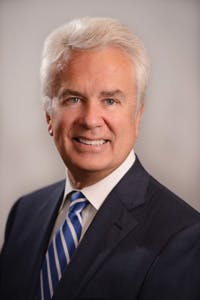Obsolete US energy policies should be overhauled, speakers say
Energy policies based on US oil and gas production steadily declining and imports steadily increasing need to be replaced with strategies that reflect growing unconventional and deepwater production, speakers recommended at a conference last month.
New US strategies also will have to consider Mexico and Canada's needs and aspirations, healthy economic growth, transportation infrastructure improvements, better water resource management, and global climate change, speakers said at the Center for Strategic and International Studies event.
"We have very ingrained, very convoluted policies which have been in place for nearly 40 years," said Theodore W. Kassinger, a partner in O'Melveny & Myers LLP's Washington office who was deputy secretary and general counsel at the US Department of Commerce during George W. Bush's presidency.
"There will be a lot of resistance to change for political reasons," he predicted. "There also will be a lot of pressure to change because of market opportunities."
Supply controls based on falling US oil and gas production and new infrastructure needs are only two of several pressing issues, according to Frank A. Verrastro, who holds the James R. Schlesinger Chair for Energy and Geopolitics and is a senior vice-president at CSIS.
"When rail used to be considered an interim crude oil transportation measure, it's now being regarded as a longer-term solution. This gives new meaning to the term 'petroleum engineer,'" he quipped.
Additional compatibility
Most US inland refineries now run exclusively on lighter US and Canadian crudes, and falling US demand potentially could make the country the world's leading products exporter, Verrastro said. "We have to address compatibility not just with an industrial agenda, but also with growing climate change concerns," he added.
Management of the US Strategic Petroleum Reserve, which was established under the 1975 Energy Policy and Control Act (EPCA) soon after the 1973-74 Arab oil embargo, has been a series of purchases and sales for widely varying reasons, said John Shages, who directed the SPR, the Northeast Home Heating Oil Reserve, and the former Naval Petroleum Reserve at Elk Hills, Calif., before forming Strategic Petroleum Consulting LLC in 2007.
"There always have been competing priorities: energy security, market impacts, and management costs," he said. "The SPR is supposed to cover 90 days of imports because that was what the International Energy Agency determined was necessary when the US and other consuming countries agreed to establish reserves initially. That's not too meaningful now that imports and demand are dropping."
Other assumptions also look questionable now, Verrastro said. "The old line of thought was that oil and gas productivity went up with the rig count," he noted. "Now, we're finding productivity climbing as the rig count goes down because rigs which drill horizontally are so much more efficient."
Hydrocarbon export restrictions have become uneven, other speakers said. EPCA allows crude oil exports from Alaska's Cook Inlet, in connection with refining or exchanges from the SPR, to Canada if it is used there, and as much as 25,000 b/d of California heavy crude, Kassinger said.
Some swaps allowed
Certain swaps could be allowed if they resulted in a corresponding amount of similar crude being imported, or if the US-produced crude can't be marketed domestically, Kassinger said, adding, "We may reach that point with some light US crudes."
Possible changes include reversing the presumption governing crude exports so the president would be authorized, but not required, to prohibit them, he indicated. The preference governing natural gas exports to countries having a free trade agreement with the US could be modified to allow sales more readily to countries considered national security allies, he said.
"Congressional authorization might not be required," Kassinger said. "The decision might not be as momentous as some people think because of transportation costs and other market factors."
North America's oil and gas renaissance is also resulting in some unexpected consequences, other speakers said. US LPG exports have surged since the beginning of 2012, and about 1.4 million b/d of capacity have been announced, according to E. Russell Braziel, president of RBN Energy LLC in Houston and co-owner of BENTEK Energy from 2005 to 2011.
"Over the last few weeks, governors in seven Midwestern states have considered declaring propane emergencies because it is needed for corn drying following exceptionally wet conditions late in the growing season," he said. "At the same time, 450,000 b/d will be exported from the Gulf Coast because they can be."
Rail has provided more flexibility with less investment for getting all grades of crude to markets, said David J. Manning, Alberta's envoy to the US. About 225,000 b/d will be shipped by rail from the Canadian province by yearend, making Alberta's bumper crops—grain and canola—compete for capacity, he indicated.
"The availability of so much energy will be the key North American economic driver for the next decade," Manning said. "Other parts of the world look at the resource availability here and are stunned because we talked about growing scarcity for so long."
About the Author

Nick Snow
NICK SNOW covered oil and gas in Washington for more than 30 years. He worked in several capacities for The Oil Daily and was founding editor of Petroleum Finance Week before joining OGJ as its Washington correspondent in September 2005 and becoming its full-time Washington editor in October 2007. He retired from OGJ in January 2020.




